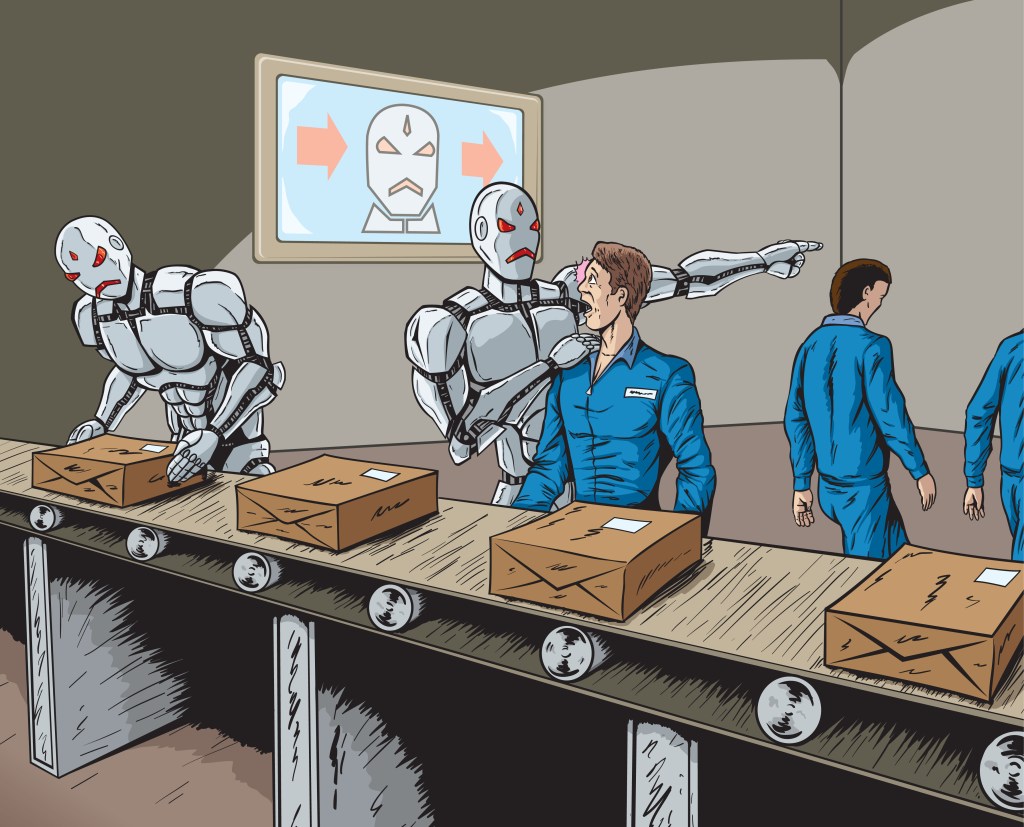Mynul Khan
Robots and artificial intelligence have come a long way since a Roomba entered your home to vacuum your floor and Siri gave you advice on the best Italian restaurants in your parents’ neighborhood.
Cars drive themselves. Robots deliver pizza. A revolution is underway. According to a 2013 University of Oxford study, half of American jobs could be automated within the next two decades. The study identified transportation, logistics and administrative jobs as the most vulnerable to automation. Others assert it is only a matter of time before robots replace teachers, travel agents, interpreters and a host of other professions.
With the prospect of such jobs disappearing, many futurists and economists are considering the possibility of a jobless future. Their predictions of what this would look like usually center around two scenarios: a dystopia where humans no longer have jobs or incomes, leading to increased income inequality and social upheaval, or a utopia where governments give incomes to their citizens, who will then be able to lead more productive, creative and entrepreneurial lives.
I think it’s time to look at this in a different way: Robots in the workforce present an opportunity to stimulate job growth and create new types of work. Robots will not merely take jobs, they’ll also create them.
A History of technology
While technology advances at an unprecedented rate, our era is not the first to undergo significant technological change. From the invention of the wheel to Gutenberg’s printing press, humans have innovated and adapted to new technologies throughout history. And for just as long, there have been concerns about how new technologies would affect laborers.
In each case, these technologies led to new industries and jobs. The invention of the printing press in 1440 allowed the mass production of books, leading to jobs to manufacture books, transport them, market them and sell them. Print shops sprung up. The fall in printing costs led to newspapers. Yes, the printing press put scribes out of business, but new jobs were soon developed to take their place.
For more recent examples, consider agriculture and textiles. In the 1800s, 80 percent of American jobs were on farms. Today, only 2 percent are. Yet as we know, the mechanization of agriculture didn’t ruin the economy. In fact, it continues today, as robots make farming easier and greener.
Around the same time, the textile industry underwent significant technological changes. With the Industrial Revolution came power looms and other mechanical equipment that reduced the need for labor in producing textiles.
Afraid of losing their jobs, Luddites, a group of textile workers and self-employed weavers, protested the use of such machines in England, even destroying them and inciting a rebellion that required military force to suppress. The fact that calling someone a Luddite today is an insult shows how unfounded their concerns were.
We need only look to our past for clues to our future. Yes, robots will do much of the work humans do today, impacting the human workforce and the type of work humans do. But as history shows us, that doesn’t mean there won’t be any work left for humans. The American labor force has weathered dramatic changes in the past two hundred years. It is resilient and adaptable.
Jobs of the future
We can get a sense of what jobs of the future will look like by looking at robots’ weaknesses and humans’ strengths.
Robots do not yet have the ability to perform complex tasks like negotiation or persuading, and they are not as proficient in generating new ideas as they are at solving problems. This means jobs requiring creativity, emotional intelligence and social skills are unlikely to be filled by robots any time soon. It’s likely our managers, nurses, artists and entrepreneurs will remain human.
We all know how great it is when technology works — and how frustrating it is when it doesn’t. Even sophisticated technology companies haven’t eliminated their human customer support teams, because when something goes wrong, it is often a human who needs to fix it.
There will always be a need for on-site, human labor and expertise when we deal with machines. Robots will have glitches, need updates and require new parts. As we rely more and more on mechanized systems and automation, we will require more people with technical skills to maintain, replace, update and fix these systems and hardware.
We see this starting already. IT departments have sprung into existence because of digital technologies. Network administrator, field service technician and web developer are job titles that didn’t exist 30 years ago.
Technology has not only created departments and jobs within companies, but created the need for entirely new companies and businesses. The demand for technical skills will only increase with an increase in automation: Someone needs to fix the robot when a part is faulty. Driverless cars will still require mechanics.
New jobs will be created in science, technology, engineering and mathematics (STEM) fields like nanotechnology and robotics. A 2011 study found that one million industrial robots directly created nearly three million jobs. Of the six countries examined in the study, five saw their unemployment rates go down as the number of robots used went up.
This study showed job creation will extend beyond the STEM fields. The authors identified six industries where employment was likely to increase directly because of robots: automotive, electronics, renewable energy, skilled systems, robotics and food and beverage. Not everyone will need to be an engineer to find jobs created by robots.
We do not need to become modern Luddites, afraid of losing our work and place in society to robots. Rather, we can welcome them, knowing they will make our lives easier, as technology always does, and knowing that by their very existence, they will create new jobs.
I am looking forward to a future where robots stimulate job growth and create exciting work we can’t even imagine today.































Comment